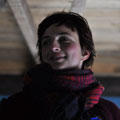Alice Rohrwacher’s Corpo Celeste
Claiborne Smith
It’s not technically true that Marta, the meek but intent girl at the heart of Alice Rohrwacher’s Corpo Celeste, is in every frame of the film, but she might as well be. Rohrwacher has so fully and subtly imagined the struggles and triumphs of Marta’s life, that this inquisitive, brave girl, who doesn’t always understand the forces arrayed against her, hovers in your mind long after the film ends.
Played by Yle Vianello, Marta is just entering adolescence as her family moves from Switzerland back to Southern Italy. Rohrwacher makes perfectly clear the stranglehold the Catholic Church has on the lives of the characters in Corpo Celeste. They vote for the candidate the church tells them to. They pay rent to the church. They gossip about other people at the church.
Soon after the family arrives in Italy, Marta is signed up for a catechism class, with the goal of making it through the rote and rehearsed confirmation process. Placid and bewildered, Marta is close to her mom, but has a demon of an 18-year-old sister who constantly belittles her. Marta isn’t a saint—her trickster side comes out as she defiantly chops her hair off, which turns out to be some kind of cardinal sin in her new town—but she reserves her harshest defiance for the local priest (Salvatore Cantalupo).
Who can blame her? Petty and embittered, the priest and the rest of the church hierarchy sells Marta, a truth-seeker, a bland bill of goods. In the eyes of this congregation, Jesus wasn’t furious about being crucified on the cross, true spiritual kindness doesn’t matter, and obedience to the church is the one true virtue. Marta eventually learns to see right through it, and the consequences are unsettling for her and everyone around her.
Despite the poetic detail with which she carefully imbues the film, Rohrwacher doesn’t get all the credit. Yle Vianello is new to acting, but pulls off a real coup in the role. Rohrwacher, whose sister is the actress Alba Rohrwacher, acknowledges she had a hard time casting the right actor, even going so far as saying that the search led her to believe the person playing the role might be an “extraterrestrial.”
“We had been visiting all our friends and acquaintances outside of town,” Rohrwacher explains, when they finally found Vianello in “a self-sufficient community on the Appennine mountains, outside of the world.” Although Rohrwacher says Vianello is different from the character of Marta, she shares with Marta “a certain disorientation, a pure expression.”
Corpo Celeste played during the 2011 Cannes Director’s Fortnight. Rohrwacher says that the Catholic Church’s reaction after the film premiered was “rather tense.” The church let it be known it “doesn’t need to be taught anything,” as Rohrwacher recalls. When the film hit theatres, however, a different reaction bubbled up.
“We received hundreds of messages from believers, and even from priests, who appreciated our work, and found themselves represented in the feelings of loneliness and emptiness the film recounts,” Rohrwacher says.
A group of catechism teachers even uses the film to teach new catechism teachers how not to teach. Eventually, an article appeared on the front page of L’osservatore Romano, the Vatican’s official daily newspaper. “It basically said ‘it’s a very hard film against us,” Rohrwacher recalls. “But it says things that are true, which we should reflect upon and learn from.’”
Corpo Celeste doesn’t feel calculated to anger the Catholic Church. It feels focused on the soul of a girl who won’t settle the way everyone else does.
“Marta is looking for a way through life,” Rohrwacher explains. “Everyone talks to her about a perfection she doesn’t identify with:a blond and distant Jesus, who has nothing in common with her own anxieties. She finally discovers that miracles are not something distant and inaccessible, but can be anything that one can touch, anything that is born from the face-to-face connection with someone else.”




